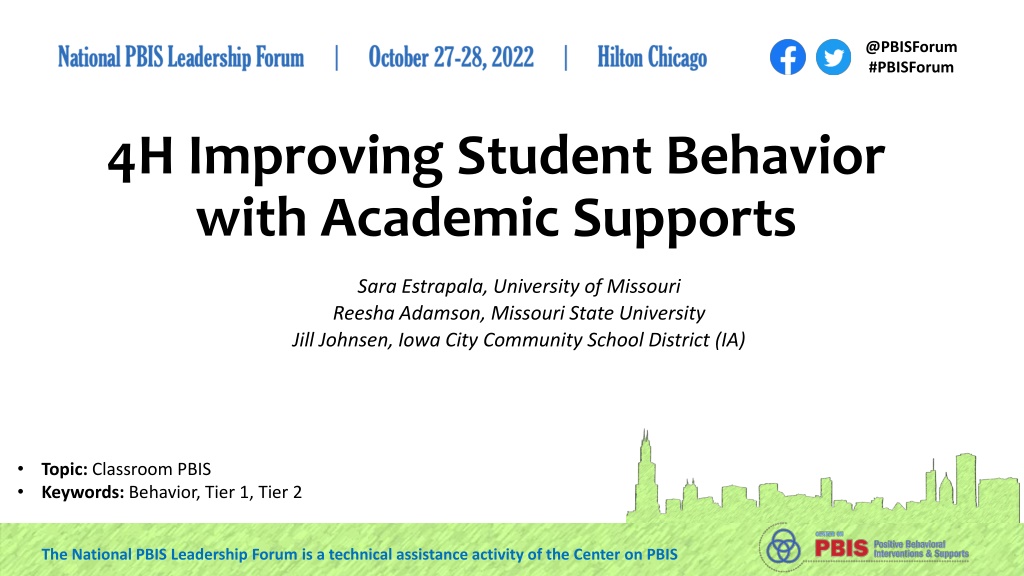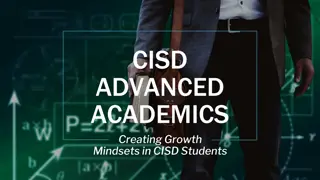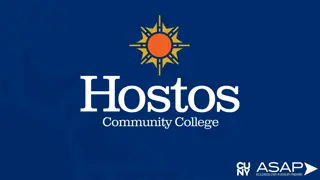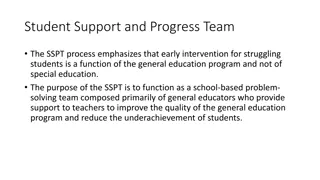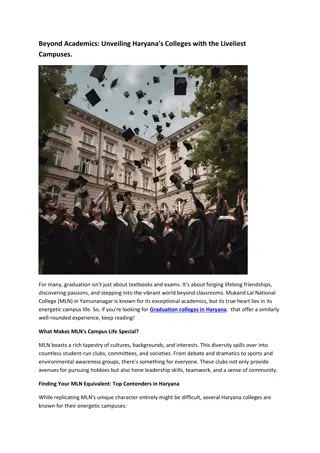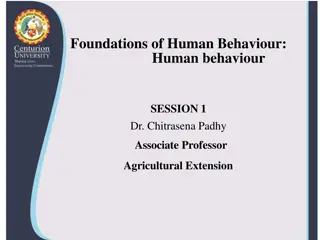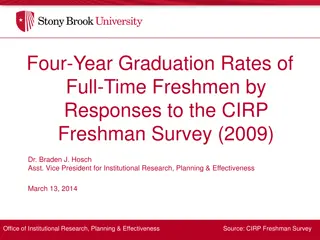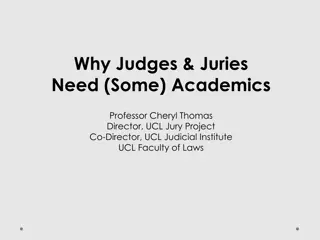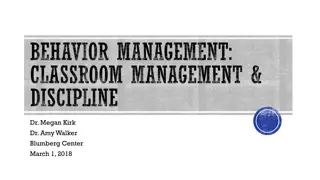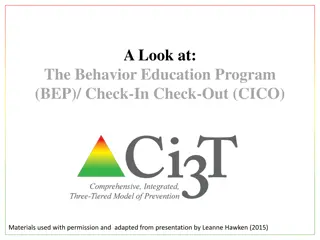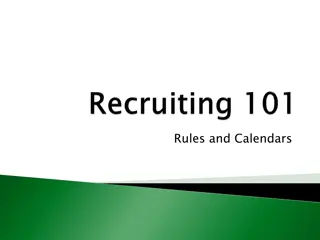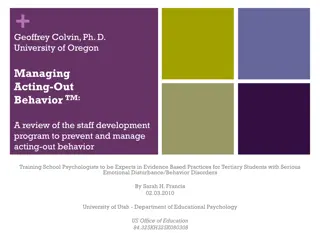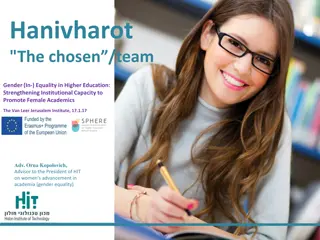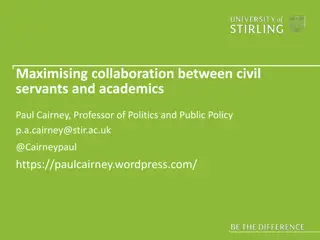Understanding the Link Between Behavior and Academics for Improved Student Support
Explore the interconnection between student behavior and academic performance, with a focus on implementing academic supports to address challenging behaviors. Learn about the importance of academic success in behavior management and strategies to promote positive outcomes. The National PBIS Leadership Forum provides insights from experts in the field, sharing real-world examples and practical tips for both elementary and secondary settings.
Download Presentation

Please find below an Image/Link to download the presentation.
The content on the website is provided AS IS for your information and personal use only. It may not be sold, licensed, or shared on other websites without obtaining consent from the author. Download presentation by click this link. If you encounter any issues during the download, it is possible that the publisher has removed the file from their server.
E N D
Presentation Transcript
@PBISForum #PBISForum 4H Improving Student Behavior with Academic Supports Sara Estrapala, University of Missouri Reesha Adamson, Missouri State University Jill Johnsen, Iowa City Community School District (IA) Topic: Classroom PBIS Keywords: Behavior, Tier 1, Tier 2 The National PBIS Leadership Forum is a technical assistance activity of the Center on PBIS
When Working In Your Team Consider 4 Questions How does this compare to our priorities? What team would oversee this work? What should we stop doing to make room for this work? How will we assess whether it s (a) implemented well and (b) working? National PBIS Leadership Forum
Learning Objectives 1. Learn the relationship between academics and behavior 2. Understand the essential components of academic supports to improve student behavior 3. Successes and challenges from real world elementary and secondary implementation National PBIS Leadership Forum
Agenda 1. Introduction to behavior & academics 2. 3. 4. Teacher-student relationships Elementary Examples Accommodations 5. 6. Secondary Examples Wrap-up National PBIS Leadership Forum
Behavior and Academics Which came first, the behavior concern or the academic concern? Majority of students with or at risk-for emotional behavioral disorders perform below grade level across academic content areas Students with learning disabilities often engage in challenging behaviors in order to escape difficult academic tasks National PBIS Leadership Forum (Algozzine et al., 2011; Harrison et al., 2015)
Students with Persistent Academic Failure Low motivation High rates of mental health concerns High rates of disciplinary contacts Low school engagement National PBIS Leadership Forum (Billingsley et al., 2018)
Many students engage in escape-maintained behaviors to avoid challenging academic tasks Academic Failure Act Out Behavior & Academics Avoid Task National PBIS Leadership Forum (Algozzine et al., 2011)
Academic Supports for Behavior Tier 1 Tier 2 Antecedent Behavior Consequence Presented with challenging academic task Disengaged Off-task Non-compliance Disruptive Task is removed (student sent to office) Business as Usual High rates of OTRs Teaching expectations Modeling & practice Self-regulation of performance Positive Classroom Climate AcademicAccommodations On-task Compliance Academic engagement Reinforce appropriate behaviors Redirect & reteach Feedback Behavior specific praise Consequence Strategies Antecedent Strategies
Classroom Climate Classroom Climate Teacher-Student Relationships National PBIS Leadership Forum
Positive classroom climate enables social, emotional, academic, and behavioral growth Classroom Classroom Climate, Climate, Behavior, Behavior, Academic Academic Achievement Achievement Students who perceive classrooms to be emotionally supportive are more motivated to learn than in unsupportive classrooms Students who feel secure in their environment are more likely to take academic risks National PBIS Leadership Forum (Larson et al., 2021; Ruzek et al., 2016)
Components of a Positive Classroom Climate Teacher-student relationships Teacher-led interactions with students Student-student relationships Positive impact on social and emotional wellbeing Educational atmosphere Learning opportunities, behavior management, physical arrangement National PBIS Leadership Forum
Positive Positive Teacher Teacher- - Student Student Relationships Relationships National PBIS Leadership Forum (Roorda et al., 2011)
Teacher-Student relationships are significantly more important for students who are at-risk for academic failure. Students Students Who are At Who are At- - Risk for Risk for Academic Academic Failure Failure Positive relationships increase positive student outcomes more significantly than students not at-risk Negative relationships negatively impact student outcomes more than students not at-risk National PBIS Leadership Forum (Roorda et al., 2011)
Consistent positive regard for children who are at-risk creates a predictable environment in which children can create trusting, respectful relationships that support autonomy and development. (p. 338, Moen et al., 2019) National PBIS Leadership Forum
Student Student- -Teacher Relationships Influence Relationships Influence Student Student- -Student Relationships Relationships Teacher Student National PBIS Leadership Forum (Hughes et al., 2001)
Establish personal connections with students Strategies to Strategies to foster Positive foster Positive Teacher Teacher- - Student Student Relationships Relationships Take time to check in with students individually Take time to laugh Share personal stories Greet students at the door Find similarities Ensure students feel cared for and supported Hold high expectations for student success Maintain positivity even during setbacks High rates of praise National PBIS Leadership Forum (Gutierrez & Buckley, 2019)
Meet Mrs. Jill Johnsen Insert video interview 1 National PBIS Leadership Forum
Mrs. Johnsens Approach to Classroom Climate Insert video interview 2 National PBIS Leadership Forum
Mrs. Johnsens Whole-Class Strategies for Developing Teacher-Student Relationships Insert Video Interview 3 National PBIS Leadership Forum
Mrs. Johnsens Approach to Individual Students Insert Video interview 4 National PBIS Leadership Forum
Research-Based Interventions to Improve Classroom Climate Intervention Essential Info Link Establish Maintain Restore (Cook et al., 2018) Research-based system for building healthy student-teacher relationships. Implementation Guide MyTeachingPartner (University of Virginia) Professional development courses to improve teacher-student interactions. https://education.virginia.edu/myteac hingpartner Double Check Classroom Check-Up (CCU; Reinke, 2022) Framework for improving culturally responsive classroom management. Training and resources available. https://www.doublecheckcoaching.or g National PBIS Leadership Forum
Data Collection & Progress Monitoring Tool Use Link Classroom Assessment Scoring System (CLASS) Suite of PK-12 direct observation measures for classroom quality https://education.virginia.edu/class room-assessment-scoring-system National PBIS Leadership Forum (Pianta et al., 2012)
@PBISForum #PBISForum Accommodations The National PBIS Leadership Forum is a technical assistance activity of the Center on PBIS
Students with EBD and Academic Performance Perform, on average, at least one year below grade level (Cullinan & Sabornie, 2004; Wagner et al., 2006). As a group receive more failing grades than any other disability category (Wagner et al., 2006). Continued academic failure may contribute to escape motivated problem behaviors, disengagement from school, and increased dropout rates (Landrum, Tankersley, & Kauffman, 2003; Wagner & Cameto, 2004). National PBIS Leadership Forum
Problems (Fuchs & Fuchs) Special Education students need accommodations to succeed in general education classes Accommodations not routinely provided When they are provided, teachers do not know how to select accommodations Most accommodations randomly selected Accommodations not matched to student need National PBIS Leadership Forum
Accommodation s vs. Modifications Changes to how academic content is presented or assessed Accommodations do not change what the student is expected to master Modifications change what the student is expected to master National PBIS Leadership Forum
Allow the student to earn a valid score, not necessarily an optimal score Accommodation s Assumptions Produce a differential boost A single accommodation is not valid or beneficial for all students A student may need more than one accommodation. Testing accommodations and instructional accommodations should be similar National PBIS Leadership Forum
Need for Appropriate Accommodations Approximately 85% of secondary students with EBD have at least one class in the general education setting. access grade level materials Help students: access instruction improve classroom performance. Prevent students from falling farther behind academically and potentially dropping out. National PBIS Leadership Forum
Center grant funded 2008-2013 Focused on secondary age students with intensive social, emotional, and behavioral problems Main purpose: develop and evaluate an intervention package National PBIS Leadership Forum
647 students, grades 9-11 Participant Characteristics Social, emotional, or behavioral problems as indicated by parent/teacher reports on a broad band rating scale and/or student self-report on measures of anxiety and depression. Demonstrate impairment at school as indicated by any one of the following: Absences Office referrals / Behavioral infractions In or out of school suspensions Failing grades in core academic subjects Cognitive ability in the average range Both special education and general education students Exclude PDD and Intellectual Disabilities National PBIS Leadership Forum
Overview of Intervention Components Intervention Focus Core Student Challenge Specific Strategy Enhancing School and Teacher Capacity Academic Skills Emotional/Behavioral Problems Classroom Structure (Expectations & Routines) Evidence-Based Academic Instruction (OTR, Accommodations) Positive Teacher-Student Interactions Building Youth Competence Connectedness Social Skills Academic Skills Mental Health Mentoring Organization and Study Skills Interpersonal Skills Securing Effective Therapy Increasing Family and Community Supports Behavior Academic Skills Social Skills Mental Health Parent Education Securing Effective Therapy & Supports National PBIS Leadership Forum
Academic Services, Supports, and Modifications for Students with EBD (Wagner et al., 2006) Modification Percentage of Students Elementary Middle High More time to take tests 72.8 72.6 75.6 Tests read to students 45.6 40.0 26.5 Modified tests 43.7 46.3 24.2 More time to complete assignments 66.5 67.3 54.2 Modified assignments 47.9 41,4 20.8 Modified grading standards 37.3 27.3 14.5 Slower-paced instruction 51.0 46.5 19.0 Peer tutoring 17.0 10.5 8.2 Adult tutoring 15.3 8.4 7.6 Learning strategies/study skills 33.0 36.5 27.5 National PBIS Leadership Forum
Initial Summary of CARS IEP Review N = 228 students (Kern et al., 2019---See Handout) Categories: Presentation mode- reading directions, questions or tests aloud, giving study guide Response mode- allowing use of calculator, use of computer Timing and Scheduling- extra time to complete tests/assignments, preferential seating in the classroom, breaks, large assignments broken down Setting- alternative testing location, small group instruction or testing Other-- various including providing prompts/cues to remain on-task, using point sheets, positive reinforcement National PBIS Leadership Forum
Most Frequently Recommended Accomodation Categories Other 16% Presentation Mode 22% Timing and Scheduling 20% Response Mode 10% Setting 32% National PBIS Leadership Forum
Recommended Use Accommodation Specifications 30.0% 25.8% 25.0% 25.0% 20.0% 16.2% 15.0% 13.2% 9.6% 10.0% 4.8% 5.0% 3.9% 0.0% Insructional Classroom Testing Instructional & Classroom Testing Local Assessments State Assessments State and Local Assessments Not Specified National PBIS Leadership Forum
Initial Conclusions Most common accommodations Setting Presentation mode Timing and scheduling Other Response mode Often determined by disability Students with ADHD frequently receive extended time Accommodations seldom linked to student need Testing accommodations not matched to instructional accommodations National PBIS Leadership Forum
Purpose of Guide Facilitate selection of one or more accommodations that are matched to the student s specific academic or behavioral needs Increase the match between a particular student s difficulty and an appropriate accommodation. Match testing accommodations to instructional accommodations National PBIS Leadership Forum
Implementation of Guide Implement Review Provide Assess Provide teachers who rated accommodations as feasible and acceptable with model on how to choose accommodations Have teachers implement the accommodation Assess student performance Gather teacher feedback and treatment acceptability data post implementation Identify student problem Select related accommodation National PBIS Leadership Forum
Baseline Data Collect student work demonstrating errors of low grades, identify accommodations listed in IEP Critical Steps for Implementation Identify Identify General Indicators of Concern Match Identify Accommodations Matched to Student's Needs Refine Refine Accommodations Meet Meet with student and gather input (especially critical as students get older) Prioritize Prioritize Accommodations and decide when to Implement TEACH TEACH accommodations Review Data Review work to see if accommodations made a difference in student performance. National PBIS Leadership Forum
If it works for secondary, why not other ages. Guide is dynamic and resources and supports vary from district to district, school to school Working document to fit in with universal systems Explicit language matched to context Progressing Farther National PBIS Leadership Forum
Participant Characteristics 147 Students age K-12th Grade 57 Elementary (grades K-5, 10 schools) 44 Middle (grades 6-8, 4 schools) 46 High School (grades 9-12, 4 schools) Guide was used as a template, started a year-long development and work with school teams to create their own guide based on key principles and process. Identified areas of need for accommodation resources and training before implementation. Refined guides based on current data collection systems and instructional contexts. Made guide dynamic in nature, customized to developmental levels National PBIS Leadership Forum
Interview and Focus Group Outcomes Teachers: "Became and instructional guidebook for working with all types of learners" "I had direct and concrete knowledge of how to support students immediately and activitely participated in IEP meetings as student advocates" "I had a plan to actually meet the needs of the kids in my class who struggle" "This was a godsend after covid to address all the lost learning" National PBIS Leadership Forum
Interview and Focus Group Outcomes Students "I felt like for once my teachers cared."-10th grader Had an 30% increased grade in his science course. "I finally moved forward and passed my classes."-11th grader Passed all his classes (where implemented) for the first semester since starting highschool. "My teacher gave me cool things that helped me learn."-4th grader Scored Basic on State Proficiency Test "I don't hate school (my classes) as much."-7th grader Tardies decreased. National PBIS Leadership Forum
Conclusion Think about accommodations as dynamic. Take the guide and make it your own tool to fit your context and your needs. Bring together a team for instructional planning for students. Equip all teachers with the tools to succeed. Think about how to measure your own outcomes. National PBIS Leadership Forum
Please Complete this Sessions Evaluation 10/28/22 4H Improving Student Behavior with Academic Supports Four options, pick one! 1. Mobile App Click Take Survey" under the session description. 4. Direct Link Click the link provided in the email reminder you receive after your session ends. 3. Online Click on the link located next to the downloadable session materials posted online at: 2. QR Code Scan the code on this slide. www.pbis.org/conference-and- presentations/pbis-leadership-forum Evaluations are anonymous! We send reminder emails to all participants. After you submit each session evaluation, click the link to enter the gift card raffle! National PBIS Leadership Forum
